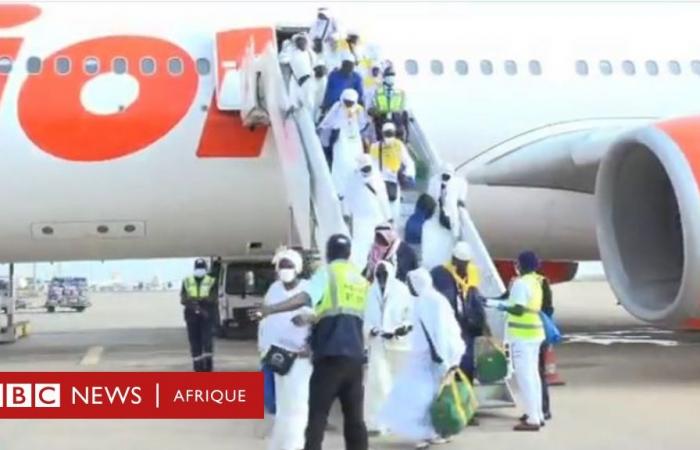Photo credit, Facebook/Ministry of Health and Social Action
- Author, Isidore Kouwonou
- Role, BBC Africa
-
4 minutes ago
Senegalese pilgrims returning from Hajj to Mecca this year arrived with the coronavirus in their luggage. Several of them tested positive for the disease when they got off the plane at Blaise Diagne International Airport (AIBD) by the air border health control service.
This year, 12,860 Senegalese took part in the 2024 Hajj to Mecca in Saudi Arabia. The strong heat, which prevailed during the rites, unfortunately cost the lives of five (05) of these Senegalese pilgrims whom the government asked to bury in the holy city.
This pilgrimage, which ended on a tragic note with more than 1,300 deaths, according to the Saudi authorities, has left many countries in mourning, particularly Africans. The Senegalese faithful began to return to the country last week. But the wave of returns constitutes another equation to solve for the country’s authorities.
The deaths recorded in Mecca aroused the curiosity of the Ministry of Health and Social Action. According to the latter, apart from the strong heat which was the main cause, there were also pilgrims who died after having breathing difficulties.
Following these numerous “cases of unsolved deaths” in Mecca this year, the ministry then decided to “strengthen its health surveillance system at the borders”.
Since the start of last weekend, seven (07) flights carrying Senegalese pilgrims have already landed at Blaise Diagne International Airport (AIBD) in Dakar. And among them, several positive cases of Covid-19 were detected. This leads the government, in particular the Ministry of Health and Social Action, to take measures.
1- The number of pilgrims reached
Three waves of pilgrims have returned from Mecca (Saudi Arabia) since last week. In total, 124 pilgrims underwent Covid-19 tests. Dr Bernabé Gning, the Director General of Health indicates that 78 cases were detected positive for SARS-CoV-2, including 36 cases confirmed by PCR on rapid diagnostic tests (RDT) carried out on pilgrims.
He emphasizes that tests on pilgrims will continue as they arrive by flight. Many Muslim faithful are still expected in the coming days. “We are waiting for other flights until Sunday,” says the doctor.
2- Positivity rate
Of the 124 pilgrims returning to Senegal, the positivity rate is 64%, according to Dr Bernabé Gning. This figure could increase in the coming days.
3- The variant detected and the symptoms
For the moment, we do not know the variant that is prevalent among pilgrims. But it is only a matter of time, since according to the Director General of Health, analyzes are currently underway in the laboratory to identify it.
“The analysis generally takes 3 to 4 days. We wait until tomorrow to be located,” indicates Dr Bernabé Gning.
Photo credit, Senegalese Ministry of Health and Social Action
4- Control and prevention measure
Senegalese authorities say they have taken measures since learning of the deaths in Mecca in Saudi Arabia. Other health measures reinforce existing measures to avoid an epidemic in the country.
Here are the measures taken to prevent the disease:
- Pre-identification by medical teams from the Ministry of Health and Social Action on site of pilgrims returning from Mecca presenting symptoms of SARS-CoV-2 type influenza syndromes (breathing difficulties, cough, fever, pain, etc.)
- Systematic screening of pre-identified suspected cases and voluntary pilgrims upon their arrival at the airport
- Systematic wearing of a mask upon departure from the boarding airport and throughout the flight
- Renunciation of communion called “Ganalé” for the case of pilgrims declared positive in order to avoid gatherings and the spread of the virus
- Contact the nearest health facility in the event of symptoms associated with SARS-CoV-2 for returning pilgrims who have not undergone the test and contact persons of positive cases
- Reporting of any case of complication linked to a return from pilgrimage for rapid treatment by the services of the Ministry of Health and Social Action using the usual channels.
The Ministry of Health and Social Action “calls on the population to be vigilant, to exercise restraint and to be more calm to avoid an epidemic,” according to the press release.
5- Risk factors for propagation
For Dr Bernabé Gning, Director General of Health in Senegal, there are three risk factors for the spread of coronavirus disease. First there are the people who hide the illness. They pose a great risk to communities and can be vectors of spread.
This is why the doctor appeals to anyone who notices a sign of the disease to contact the nearest health services.
Then the positive people who do not respect the instructions given to them. The government calls on them to cooperate to prevent the virus from spreading in the country.
Finally, there is the risk of gathering with positive people in communities. This is a situation to absolutely avoid, according to the Director General of Health. People found positive must practice isolation until they are completely cured.
Monitoring the disease
Photo credit, Getty Images
The Senegalese authorities are monitoring new cases of coronavirus detected in the country. However, questions remain about the behavior of the population to prevent the spread of the disease, especially as the Shura or couscous festival is fast approaching.
It is an occasion very celebrated by the population in Senegal, where families come together in community. The government must then manage the next arriving pilgrims and prevent possible positive cases from congregating with the community.
In all cases, the Ministry of Health has taken measures to manage serious cases of Covid-19. A place has been set up within the ministry’s services to receive these cases and process them properly.
Relatives only need to report the existence of these cases so that the authorities can confine the scene and dispatch their services.






